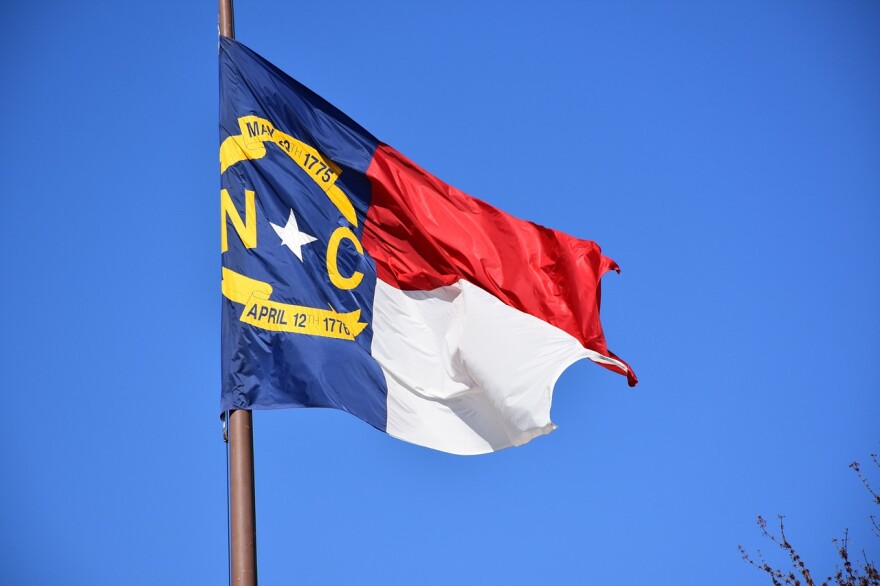President Trump signed his one 'big, beautiful bill' on Friday, setting the stage for trillions of dollars worth of tax and spending policy. In North Carolina, the bill is likely to have a big impact on everything from Medicaid expansion and food stamps to the 2026 Senate election and state politics. Joining me to talk about the far-reaching effects is Adam Wagner with the NC Newsroom in Raleigh.
Marshall Terry: So the most immediate impact of this bill is actually on one particular North Carolinian — Sen. Thom Tillis. He won't be running for reelection after he became the state's only Republican to vote against the bill. What happened there?
Adam Wagner: So, Sen. Tillis had some specific concerns about how the bill shifts around health policy and what it could mean specifically for the more than 650,000 North Carolinians who started getting Medicaid under the state's Medicaid expansion a couple of years ago.
Basically, Sen. Tillis warned in a floor speech that, come about two years from now, those North Carolinians wouldn't have health insurance anymore.
He said that he couldn't explain that to them, and that was a pretty significant break with President Trump that brought to a head some tensions that had long been simmering. And around the same time, he voted against the bill, Sen. Tillis announced that he plans to not run for reelection.
Terry: And what's the impact of this suddenly open Senate seat going to be on the state's politics? I mean, does it make former governor Roy Cooper a Democrat more likely to jump in, and who's eyeing the seat on the Republican side?
Wagner: We know that Gov. Cooper has been considering a run for going on months now. Basically, ever since he left the governorship. He notably, after the House passed the bill, put a tweet on X calling it shameful. That was kind of a flag in the ground where he could distinguish himself. As far as the Republican side, we know that Lara Trump is looking at it.
We've heard other names like Michael Whatley, former head of the state GOP; freshman Congressman Pat Harrigan has reportedly been kind of floated around. Honestly, it's probably just going to come down to what Donald Trump wants.
Terry: On to actual policy now. The Trump bill contains some big cuts for Medicaid, SNAP, formerly known as food stamps, and other social safety-net programs. What's going to happen to those programs in North Carolina?
Wagner: So Gov. Josh Stein, who is a Democrat, has been warning all of those programs basically become imperiled under this bill. With SNAP, he has said that the legislature needs to find $420 million. It's like a match they have to pay; then that lets the state draw down the rest of the federal money. If the state can't find that $420 million, Stein says it won't be able to participate in SNAP at all, and that would mean that about 1.4 million North Carolinians wouldn't receive food assistance.
As far as health care policy, Stein has said that it would effectively end Medicaid expansion in North Carolina, so that would be about 660,000 additional North Carolinians that wouldn't have health insurance option anymore. Stein has also said that about another 520,000 North Carolinians would have their healthcare imperiled through changes to either Medicaid or through the marketplace, commonly referred to as Obamacare.
Some of that could be picked up by the state legislature finding money to either match funds, draw down federal money. A lot of things are kind of up in the air.
Terry: And the General Assembly still hasn't agreed on a budget for the next two years, and the state House and Senate are nowhere near each other. How are they going to solve a multibillion-dollar hole that's now blown in the state's budget on top of that?
Wagner: So we don't have a lot of intel into this yet, and I think it really does kind of become the most important policy question in state politics right now. This is millions and millions and millions of dollars in a state that is already facing pretty steadily mounting costs for the Helene recovery. I think that the legislature has pretty tough decisions to make here.
Terry: And does that help Democrats in North Carolina, who can't seem to get their statewide mojo back, if there are big cuts, they can blame it on Republicans?
Wagner: I think that it will become an issue in the 2026 elections. It obviously will be one in the congressional elections statewide. A lot of the districts are weighted heavily one way or the other — either Democratic or Republican. But in the closer ones, I think the Democrats will see a chance to really push on that. On the state level, we will see how Republicans handled the Medicaid issue and the SNAP issue, but that takes what was a federal issue and makes it a state ballgame as well.



